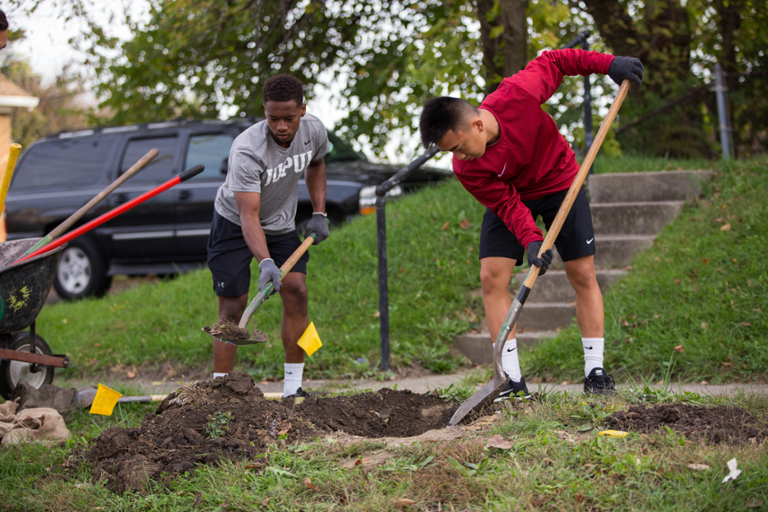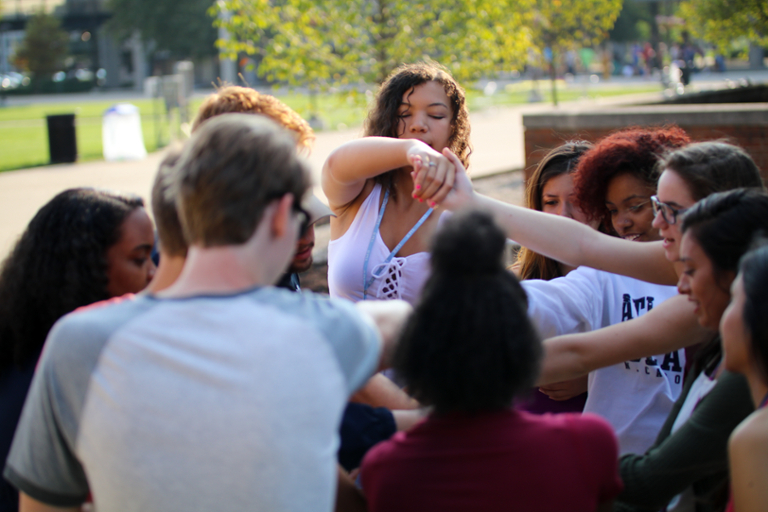IUPUI recognizes students’ need to identify hands-on learning experiences that suit their unique backgrounds and interests. The Institute for Engaged Learning provides guidance for this by creating necessary resources and communities of support. Accessible opportunities for engaged learning give every student the chance to fully apply themselves in their education.

Forms of Engaged Learning
Engaged learning comes in the form of high-impact educational practices that facilitate learning outside the classroom. From undergraduate research to service learning, these practices can come in many forms.
High-impact practices have a positive association with student retention, persistence, critical thinking, and overall engagement.
"High-impact educational practices: What they are, who has access to them, and why they matter.” AAC&U, Washington, D.C
The following engaged learning opportunities at IUPUI are just a few ways that students can harness high-impact educational practices:
Undergraduate Research
Engaging in research allows students to expand on the learning that takes place in the classroom by observing, investigating, and answering important questions that will advance knowledge in their discipline. The Center for Research and Learning supports students through faculty mentorship, project supply funds, and opportunities to present research.
Service Learning, Community-Based Learning
Students involved in service and community-based learning are able to give back to the community while simultaneously enhancing their own learning. For example, a biology student may learn about ecosystems and biodiversity by volunteering with a conservation group to preserve wetlands. The Center for Service Learning makes such opportunities possible by connecting students to service-based student organizations and civic engagement events.
Internships
Internships can give students future workplace advantages by providing direct exposure to professional settings prior to graduation. IUPUI’s On-Campus Internship Program, Sophomore Internship Program, and Life-Health Sciences Internship Program help students connect with opportunities that directly relate to their academic programs.

Learning Communities
Learning communities operating on campus are cohorts of students, faculty, and staff who apply community building and out-of-class activities. Students are often enrolled together in multiple classes that revolve around a common theme.
Amy Powell, director of the Learning Communities program within the Institute for Engaged Learning, has witnessed many forms of engaged learning at its best. “The experiences these students are having are life-changing,” Powell said. “They're very deep, rich, meaningful experiences. That wouldn't happen if they weren't going outside the classroom.”

In the Communicating in Sports and Tourism learning community, students combined service learning with course concepts by helping Indianapolis public school children train for a kid-friendly marathon. In another learning community, students integrated concepts from two of their courses—Introduction to Criminal Justice and Introduction to Speech—by participating in a Toastmasters public speaking program at a nearby correctional facility.
Making Engaged Learning Accessible
Every student can benefit from the abundance of engaged learning options available at IUPUI, but the challenge for many can be finding the time and energy to seek out these opportunities. With 40% of IUPUI students coming from low-income households, many work full-time while going to school, and others balance raising a family in between work and classes.
For these reasons, the Institute for Engaged Learning’s top priority is making engaged learning accessible. Jerry Daday, executive dean of the Institute for Engaged Learning, spoke about several steps IUPUI has taken to achieve this. “Our job at IUPUI and specifically in the Institute for Engaged Learning is to promote equitable high-impact practices,” he said. “Part of that is working with the schools and faculty to find ways to embed these into the curriculum, so when students take the class, they are having that practice at the same time.”
Our job at IUPUI and specifically in the Institute for Engaged Learning is to promote equitable high-impact practices.
Jerry Daday, Executive Dean, Institute for Engaged Learning
In addition to integrating engaged learning experiences into courses, IUPUI helps provide incentive for engaged learning through scholarships and other financial support. Work-study awards, paid internships, service learning and study abroad scholarships, and research stipends are just a few of the ways students are supported in their pursuit of deeper understanding and personal growth.
The goal of the institute is not only to create engaged learning opportunities but to help students harness them in ways that work with their interests and backgrounds. Whether students choose to study abroad, conduct research, or volunteer in their communities, these opportunities can build the confidence to dream big and achieve big.
About the Institute for Engaged Learning
The Institute for Engaged Learning promotes undergraduate learning through equitable access to pathways of connected curricular and co-curricular, experiential, applied, and integrative learning opportunities. Additional engaged learning experiences supported by and affiliated with the Institute for Engaged Learning include:
- First-Year Seminars and Experiences
- Common Intellectual Experiences
- ePortfolios
- Capstone Courses and Projects
- Diversity/Global Learning
Check out last month’s article from this three-part series and read all about the institute's debut recently featured in JagNews. Stay tuned for next month's article to discover more about the benefits of engaged learning at IUPUI.
For more information, contact the Division of Undergraduate Education Office of Communications at duecomm@iu.edu.

